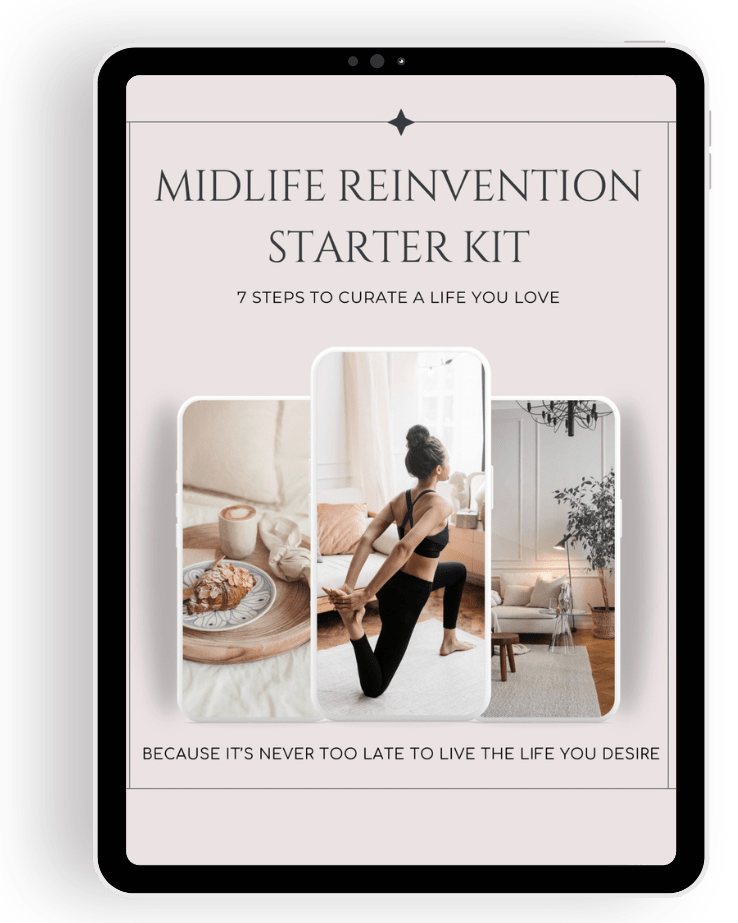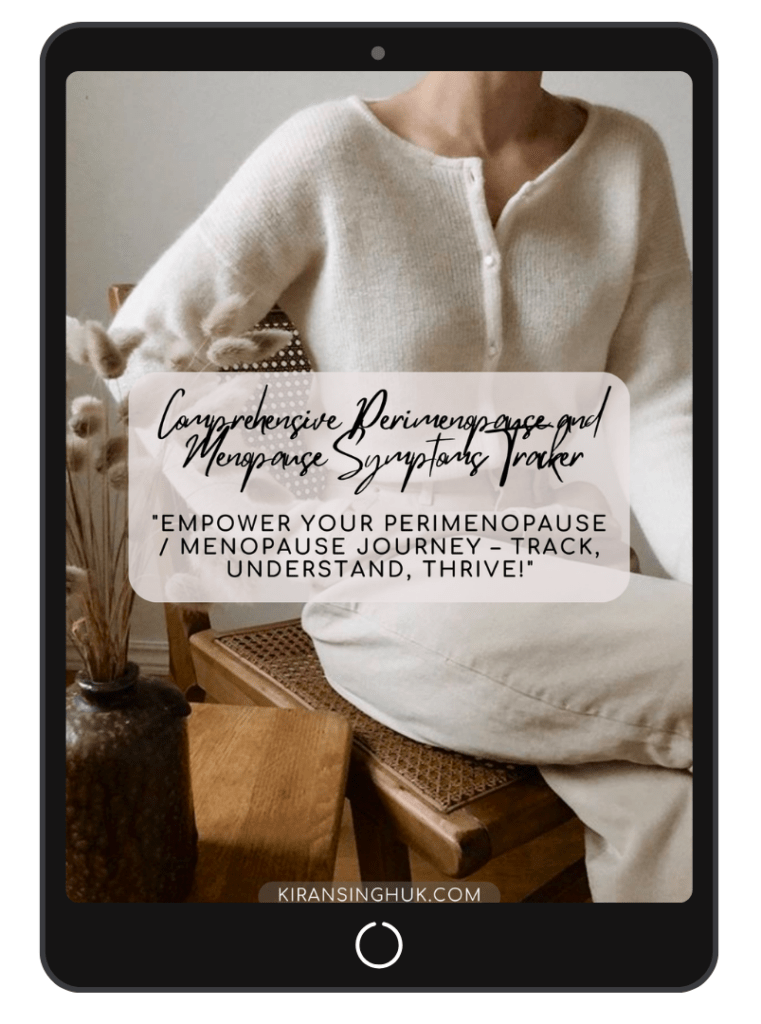Menopause marks a significant transition in a woman’s life, bringing a host of physiological changes – including shifts in cholesterol levels that can impact long-term heart health. While many women focus on hot flashes, mood swings, and sleep disturbances, changes in cholesterol metabolism during perimenopause and menopause are often overlooked.
This guide explores the relationship between menopause and cholesterol, how declining oestrogen affects heart health, and the practical steps you can take to optimise your cholesterol levels during this phase of life. Whether you have been recently diagnosed with high cholesterol or simply want to be proactive, this guide will provide evidence-based insights, journaling prompts, FAQs, and actionable steps to empower you on your journey to better heart health.

Understanding Cholesterol and Its Role in the Body
Cholesterol is often misunderstood. While it has a bad reputation, it’s actually essential for overall health. Cholesterol plays a vital role in:
- Hormone production – It’s a building block for oestrogen, progesterone, and testosterone.
- Cell membrane function – It helps maintain the integrity and flexibility of cell membranes.
- Vitamin D synthesis – The body uses cholesterol to produce vitamin D when exposed to sunlight.
- Bile production – Cholesterol aids in digestion by helping the liver produce bile acids.
Types of Cholesterol: The Good, the Bad, and the Ugly
Cholesterol is transported in the blood by lipoproteins:
- LDL (Low-Density Lipoprotein) – “Bad” Cholesterol
- High levels contribute to plaque buildup in the arteries, increasing the risk of heart disease and stroke.
- HDL (High-Density Lipoprotein) – “Good” Cholesterol
- Helps remove excess cholesterol from the bloodstream, lowering heart disease risk.
- Triglycerides
- A type of fat in the blood, which can rise due to poor diet, inactivity, and hormonal changes.
- High levels are associated with metabolic syndrome, insulin resistance, and heart disease.
Maintaining a healthy balance between these lipids is crucial, especially during and after menopause.
How Perimenopause and Menopause Affect Cholesterol Levels
The Role of Oestrogen in Cholesterol Metabolism
Oestrogen plays a key role in regulating cholesterol. It:
- ✔ Increases “good” HDL cholesterol
- ✔ Lowers “bad” LDL cholesterol
- ✔ Reduces triglyceride levels
- ✔ Helps keep arteries flexible, reducing heart disease risk
However, as oestrogen declines during perimenopause and menopause, these protective effects weaken, leading to:
- ❌ Increased LDL (“bad”) cholesterol
- ❌ Reduced HDL (“good”) cholesterol
- ❌ Higher triglycerides
- ❌ Greater risk of arterial plaque buildup (atherosclerosis)
These changes increase the risk of heart disease, which is why postmenopausal women are more likely to develop high cholesterol, hypertension, and cardiovascular disease than premenopausal women.
My Personal Journey with Cholesterol During Perimenopause
I was completely shocked when my blood test results showed elevated cholesterol levels a year and a half ago. A few months prior, I had been under immense stress while moving house, and during that period, a clean diet hadn’t been my priority. Instead of my usual home-cooked meals, I found myself relying on instant lattes three times a day and frozen food for at least one meal daily, simply because I didn’t have the energy to cook. While I knew my diet hadn’t been perfect, it didn’t seem bad enough to cause such a drastic change in my cholesterol levels.
Determined to understand what was happening, I started researching – and it didn’t take long to realise that perimenopause was playing a significant role in this unexpected factor. The hormonal shifts meant that my body was processing fats differently, despite my somewhat healthy habits at the time. When I spoke to my GP, they dismissed my concerns. Determined to take control of my health, I sought a second opinion through a private GP via my life insurance.
Now, I’m actively working to optimise my cholesterol levels through lifestyle changes and expert guidance. I eat home-cooked meals daily, go for 1-2 hour long walks daily, do strength training at the gym 3-5 times a week, and maintain an overall healthy lifestyle.
How to Improve Cholesterol Levels During Menopause
1. Prioritise a Heart-Healthy Diet
- Increase soluble fibre – Foods like oats, flaxseeds, lentils, beans, and apples help lower LDL cholesterol.
- Eat more omega-3 fatty acids – Found in walnuts, chia seeds, flaxseeds, and oily fish, omega-3s reduce triglycerides and inflammation.
- Limit processed foods and trans fats – Avoid fried foods, commercial baked goods, and margarine, as these raise LDL and lower HDL.
- Focus on plant-based proteins – Lentils, tofu, chickpeas, and nuts can help lower cholesterol naturally.
- Incorporate healthy fats – Avocados, olive oil, and nuts improve cholesterol balance.
2. Move Your Body Daily
- Strength training – Helps increase metabolism and lower LDL cholesterol.
- Cardio workouts – Walking, swimming, cycling, and dancing improve heart health.
- Yoga and Pilates – Help reduce stress and regulate cholesterol levels.
3. Manage Stress Effectively
Chronic stress triggers cortisol release, which can lead to:
- ❌ Higher triglycerides
- ❌ Increased LDL cholesterol
- ❌ More belly fat (linked to heart disease)
✔ Try meditation, deep breathing, journaling, or spending time in nature to lower stress levels.


4. Optimise Sleep
Lack of sleep raises LDL cholesterol and triglycerides. Aim for:
- ✔ 7-9 hours of quality sleep per night
- ✔ A relaxing bedtime routine
- ✔ Limiting caffeine and screens before bed

5. Consider Hormone Replacement Therapy (HRT)
- HRT can help balance cholesterol levels by maintaining oestrogen’s protective effects.
- It may reduce LDL and increase HDL, supporting heart health.
- Speak with a healthcare provider to assess the risks and benefits for you.
Journaling Prompts for Reflection
- How do I feel about my cholesterol levels and heart health?
- What changes can I make today to improve my cholesterol balance?
- What role does stress play in my health, and how can I manage it better?
- How can I prioritise heart-friendly foods in my daily diet?
- What movement brings me joy, and how can I incorporate more of it into my routine?
FAQs: Menopause and Cholesterol
1. Why does cholesterol increase after menopause?
Due to oestrogen decline, LDL levels rise, HDL levels drop, and triglycerides may increase, raising heart disease risk.
2. Can I lower cholesterol without medication?
Yes! Diet, exercise, stress management, and sleep play a huge role in lowering cholesterol naturally.
3. Should I take statins for high cholesterol during menopause?
This depends on your overall heart disease risk. Speak to a doctor to assess whether lifestyle changes alone are enough or if medication is needed.
4. How quickly can I improve my cholesterol through lifestyle changes?
With consistent effort, improvements can be seen within 6-12 weeks.
5. Does HRT help with cholesterol?
For many women, HRT helps balance cholesterol by restoring some of oestrogen’s protective effects.
Case Study: Sarah’s Journey to Managing Cholesterol During Menopause
Background
Sarah, a 52-year-old woman, had always maintained a healthy lifestyle. She followed a balanced diet, exercised regularly, and had no history of high cholesterol. However, after entering perimenopause at 47, she began experiencing changes she couldn’t explain. She gained weight around her midsection, felt more fatigued, and started experiencing occasional heart palpitations.
At her routine health check-up, her GP recommended a cholesterol test. The results surprised her:
- ✔ LDL (“bad”) cholesterol: Elevated
- ✔ HDL (“good”) cholesterol: Lower than usual
- ✔ Triglycerides: High
Despite making no significant changes to her diet or exercise routine, her cholesterol levels had shifted in an unhealthy direction. Her doctor explained that declining oestrogen levels could be responsible for these changes.
The Problem: Struggling to Understand the Changes
Sarah was confused and frustrated. She had always been mindful of her health, so why was her cholesterol increasing now? She decided to:
- Monitor her diet more closely to ensure she isn’t unknowingly consuming unhealthy fats.
- Increase her exercise intensity, adding more strength training and brisk walks.
- Reduce stress through mindfulness and journaling.
Despite these efforts, her cholesterol levels remained high six months later. She felt discouraged and wondered if she would need to take statins for the rest of her life.
The Solution: Personalised Lifestyle Adjustments
Determined to take charge, Sarah booked a consultation with me and I helped her make targeted lifestyle changes:
- ✔ Dietary Tweaks: She increased her intake of soluble fibre (oats, flaxseeds, lentils, beans) to help reduce LDL cholesterol naturally.
- ✔ Healthy Fats: She added more omega-3-rich foods like walnuts and chia seeds to her diet.
- ✔ Strength Training Focus: Instead of just walking, she incorporated Pilates and resistance exercises to improve metabolism.
- ✔ Mindful Stress Management: She committed to daily meditation and breathing exercises to lower cortisol levels, which can contribute to high cholesterol.
- ✔ HRT Consideration: After discussing it with her specialist, she started HRT to address hormonal imbalances contributing to cholesterol changes.
The Results: A Positive Shift in Health
After six months of consistent efforts, Sarah’s follow-up cholesterol test showed improvement:
- ✔ LDL (“bad”) cholesterol: Reduced by 18%
- ✔ HDL (“good”) cholesterol: Increased by 12%
- ✔ Triglycerides: Lowered significantly
She also noticed an improvement in her energy levels, weight stabilisation, and fewer palpitations.
Key Takeaways from Sarah’s Story
- Menopause-related cholesterol changes are common, even in women who live a healthy lifestyle.
- Small, intentional lifestyle changes can lead to significant improvements over time.
- Seeking expert guidance and getting a second opinion can be life-changing.
- HRT may be a valuable tool for managing menopause-related cholesterol shifts.
Sarah’s story is a reminder that while menopause brings unexpected changes, taking a proactive, informed approach can help you regain control of your health.
Does Sarah’s story resonate with you?
Share your own experiences with cholesterol changes during menopause in the comments or reach out for personalised support. Let’s navigate this journey together! 💙
Actionable Steps to Take Today
- ✔ Book a cholesterol test if you haven’t had one recently.
- ✔ Start tracking your meals to ensure a heart-healthy diet.
- ✔ Move your body for at least 30 minutes daily.
- ✔ Reduce stress levels through relaxation techniques.
- ✔ Improve sleep quality with a consistent bedtime routine.
- ✔ Consider discussing HRT or alternative treatments with your doctor.
Final Thoughts: Take Charge of Your Heart Health
Perimenopause and menopause are powerful transitions, but they don’t have to define your future health. By understanding the connection between menopause and cholesterol, making intentional lifestyle changes, and seeking the right medical support, you can protect your heart and thrive in midlife and beyond.
Call to Action
Are you struggling with cholesterol changes during menopause? Let’s continue the conversation – share your thoughts, challenges, or breakthroughs in the comments or reach out for personalised coaching support. 💙

Feel free to sign up to my Friday Morning Love Note HERE! This isn’t just a newsletter - it’s your invitation to pause, reflect, and realign with you. Every week, we’ll journey together to uncover the small, meaningful shifts that will help you design a life that feels uniquely and beautifully yours. Each week, I’ll deliver fresh intentions, uplifting tips, and simple shifts to inspire purposeful, creative living.











